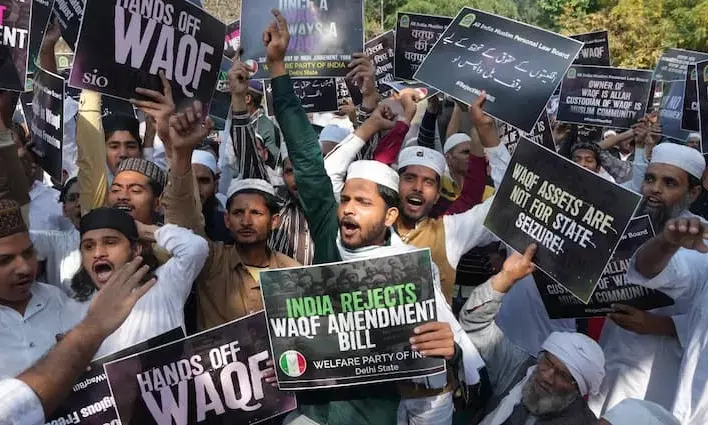Waqf Act faces heat from today, Muslim Personal Law Board launches protests; BJP highlights benefits of the bill
Amid growing dissent and support, the Waqf law becomes the center of political storm; Opposition alleges it targets minority properties;

A nationwide debate has erupted over the Waqf Amendment Act, with opposition leaders and several Muslim organizations raising serious concerns. Protests are taking place across the country. In this context, the All India Muslim Personal Law Board (AIMPLB) has launched a "Save Waqf Campaign" starting today, April 10, which will continue till July 7.
As part of this campaign, several programs are scheduled, including sit-ins at every district headquarters, submission of memorandums to the President via District Magistrates, and press conferences in 50 major cities.
Meanwhile, in Kolkata, the Jamiat Ulama-e-Hind is also staging a protest. In support of the act, the BJP has stepped in and launched an outreach campaign in Muslim areas of Mumbai starting today. The campaign will aim to explain the provisions of the Waqf Act to Muslims and collect "Thank You Modi" forms.
AIMPLB's strategy against the Waqf Act
- The first phase of the protest will run from April 10 to May 7.
- Dharnas and arrest programs will be held in all state capitals.
- Protests will be held by forming a human chain after every Friday namaz.
- On April 22, a special program will be held at Talkatora Stadium in Delhi regarding the protection of Waqf property.
- On April 30, at 9 pm, the lights of houses, offices, and factories will be switched off and a half-hour blackout will be done.
- A big protest program will be organized at Ramlila Maidan in Delhi on May 7.
- The women's wing of AIMPLB will also run awareness programs at various places.
- Press conferences and meetings with intellectuals will be held in 50 big cities of the country, like Delhi, Mumbai, Lucknow, Ahmedabad, Hyderabad, Ranchi etc.
The board says that they will not accept this law under any circumstances and the public has been appealed to register protest through blackout at 9 pm on April 30 and send a memorandum to the President by staging a sit-in in the districts.
In Kolkata too, Jamiat-Ulema-e-Hind is starting a protest from today. This protest will be led by Mamata government minister Siddiqullah Chowdhury. Mamata Banerjee herself is also opposing the Waqf law. She has said that she will not allow this law to be implemented in Bengal and the Muslim community need not fear it.
Congress leader Rahul Gandhi also raised questions on this law and said that after the Waqf law, now the eyes of BJP and RSS are on the properties of churches and gurudwaras. He said in a convention in Ahmedabad that minorities should be cautious of this law.
Former Chief Minister of Jammu and Kashmir Omar Abdullah has also said that the people here are angry with the Waqf Act and it is also affecting the proceedings of the Assembly. He has talked about taking it to the Supreme Court.
At the same time, the BJP has decided to start an awareness campaign in support of the Waqf law. This journey is starting from today in the Muslim-dominated areas of Mumbai, in which the Muslim community will be given descriptive information about the law, all doubts will be resolved and people will be asked to fill a "Thank you Modi" form expressing support.
BJP says that the opposition is misleading the Muslim community while the purpose of this law is to ensure transparency and accountability. BJP is calling it a corrective step in the interest of Muslims.
The Waqf Amendment Bill was passed by both houses and was approved by President Draupadi Murmu on 5 April 2025. In the Rajya Sabha, 128 votes were cast in favor of the bill and 95 against it, while in the Lok Sabha, 288 MPs supported it and 232 opposed it.
Now it remains to be seen which ideology wins in the Muslim society of the country regarding the Waqf law - the strong opposition of AIMPLB and the opposition, or the dialogue and support campaign of the BJP. This issue has not only heated the political atmosphere, but has also sparked a deep discussion at the social and religious level.

